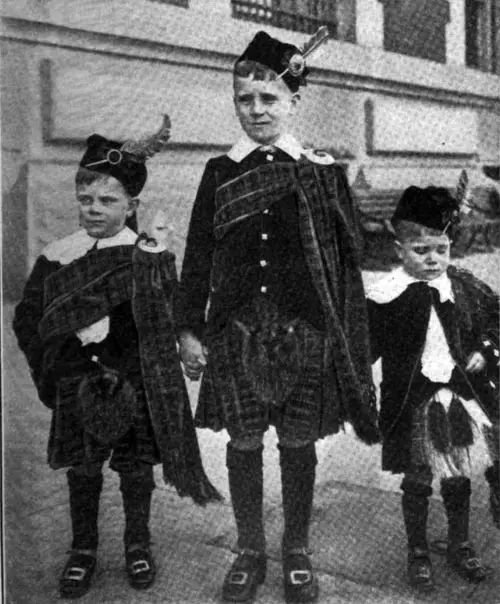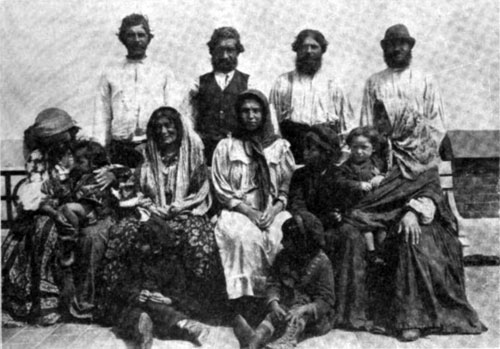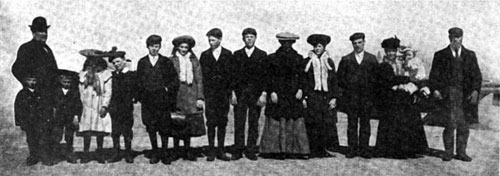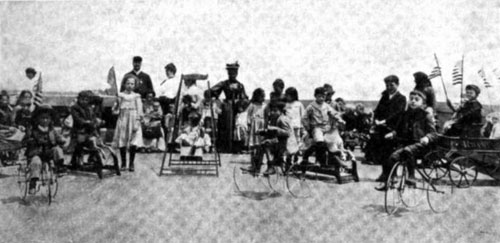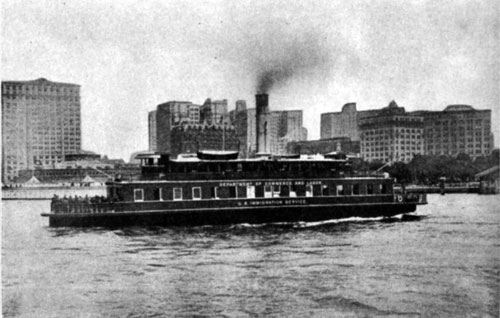A Million Immigrants A Year
A Million a Year
By Charles L. Thompson, D.D.
( Used by permission of The Christian Endeavor World.—Editor.)
Photo 01 - Ruthenian Immigrant Girl
Not a million dollars a year. though that would be interesting and, in these days, rather frequently attained, so frequently as to raise a great many problems and project some important questions. But a million people a year is far more interesting, far more suggestive. and raises more interesting and perhaps more serious problems.
Our country is somewhat used to dealing with people. From the first founding till now there has been a steady flow, but the flood of people coming in during the last decade is something new, and raises in the minds of all thinking people the question, "What will be the effect upon our national life of such a tremendous influx of foreign elements?"
Hitherto they have come in a measure that could be easily assimilated, but whether the digestive powers of the country are great enough to take a million a year is now before the country.
Photo 02 - Three Young Highlanders
They come from everywhither. The Orientals would come if they had a chance. The Occidentals are coming from all the countries of Europe and from some of the countries of Asia.
Perhaps the most suggestive fact concerning our immigrants relates to the fact that nearly three-fourths of them during the last year or two have come from Austria-Hungary, Italy, and Russia.
The rapid rise of the immigration from those three countries is phenomenal. Thus in 1850 the immigration from Italy was very small; last year it reached the enormous figure of 230,622. The immigration from Hungary began in 1861, and was very little for the next nine years, but last year it reached the grand total of 206,000. The immigration from Russia. which was practically nothing in the middle of the nineteenth century, last year amounted to 136,093.
Why Do They Come?
Why are so many foreigners coming to us. and especially from the countries above noted?
There is a push and a pull, but by far the greater force is the pull. When there is pressure in any part of the Old World,—famine. political unrest, or revolution,—that sends people towards these quiet and prosperous shores; but on the whole that which more than anything else has determined the flood-tide of immigration is the economic condition of our own country.
In hard times the tide sinks; in prosperous times it rises. Our present great prosperity has rolled it up to practically a million a year, this year probably considerably more than a million.
Photo03 - Some People Not Admitted At Ellis Island
Whither are they going when they have passed through the gate of Ellis Island? This question is now engaging our statesmen and our students of social economics.
A large percentage of them gather in our great cities and remain there, struggling for a living in the already overcrowded conditions of city life. Many go to the mining regions of Pennsylvaqia, West Virginia, and farther west. A small proportion of them, alas, by far too small a proportion! go to till the Western lands.
The question of distribution is a question at which the Government is now taking a hand. A million a year could be easily assimilated if properly distributed. Texas, for example, could absorb a large part of them, but Texas received a year ago only a little more than two thousand. Nebraska has room for many thousands, but Nebraska received a year ago only four thousand. Montana has boundless space and opportunities for work; it received two thousand. Oregon received less than two thousand, and Washington less than seven thousand.
The Commissioner-General of Immigration has devised a plan to establish a division of information whose purpose shall be to place the immigrant coming to this country in a place where he is needed. The Government is now gathering information regarding the resources and products of every state and territory. preparatory to publishing it in different languages so that it may be placed in the hands of the aliens as soon as they land, and may help them to choose a place for their homes.
State " Promoters "
The plan further provides that the states will be permitted to send to the immigrant stations agents who shall be given access to all newly admitted aliens. These official promoters will point out the special inducements for settlement offered by the respective States.
Photo 04 - An Irish Immigrant Family
Having received them and having located them as intelligently as may he, what can we do for this million a year that they may become intelligent and useful American citizens?
The legislatures of Pennsylvania and New Jersey have recently passed bills authorizing state support to evening schools for the study of English in non-English-speaking labor camps and communities. These schools are to be opened on request of twenty adults who wish to avail themselves of their privileges. According to the petitions now coming in to the authorities of Pennsylvania no less than two hundred schools will he called for in that state alone. The example of these states is likely to be followed by others, as New York, Ohio, Connecticut, and Illinois.
The difficulty of course, as in all work among foreigners, will be to secure properly qualified teachers to teach the people of these various languages and nationalities. Vet the difficulty must be overcome. Nothing is more important than that these people should be taught the rudiments of our civic life.
They can be trained to be Americans. Most of them are very anxious to learn the laws, customs, and institutions of our country; and, if their moral and religious training shall keep pace with their training in the primary principles and responsibilities of our national life, instead of being a peril to us they will become a blessing. For we must not forget that it is immigration that has made us. that our country has become strong by the union of the diverse elements of European nationalities.
No one can watch them with an intelligent and sympathetic interest as they pour through the gates at Ellis Island without knowing that they have in them, for the most part, the making of good citizens. With the restrictions now put upon immigration, it will be our fault if they fail to become such. Indeed, by a law recently passed they will not become citizens at all until they have gone through a course of training to fit them for that prerogative.
We have been too free in extending franchises to unlettered foreigners. We have placed the unlettered man who has just entered our gates on an equality at the ballot-box with the most intelligent man in the country. Undoubtedly this was one of the reasons why such an outcry has been raised against immigration and there has been so strong a demand for increased restriction.
Last fall a federal naturalization law was enacted, by the terms of which naturalization hereafter will require five years of unbroken residence in the United States, the application for citizenship to be made in English by the alien personally present and addressing the court in English verbally, and signing the application in presence of the court.
As a matter of fact, the best place to apply restrictive measures will be at the points of embarkation on the other side of the water. Governments like Italy, loath to lose their citizens as rapidly as they are now losing them, will be glad to co-operate with any well-concerted efforts of our Government to prevent the embarkation of undesirable people. This will be better than to turn them back after they have crossed the ocean.
What to Do With Them
Rut now, once within our gates, what shall we do with them?
They are quick to respond to loving sympathy They are very much like ourselves. What moves us will move them; what interests us will interest them. Nothing is more suggestive and hopeful than the atmosphere of kindness and consideration which now pervades the administration at Ellis Island. The strangers are well taken care of there. It becomes the Christian duty of our country to take care of them when they have left that island and become an integral part of our country.
As in all populations, but pre-eminently in the foreign populations, the most hopeful field is in the children. It is difficult to make thorough Americans or thorough American Christians of the adult population coming hither. The children can be easily reached. As a friend of the public-school system, however, and as one having faith in its capacity to develop Americanism, I would day that first of all adequate provision should be made in the public-school system for all children of foreigners.
Photo 05 - Immigrant Children Playing On The Roof At Ellis Island
In addition to these, mission schools conducted by the mission boards of the various denominations would be of immense advantage and would be the most direct means of influencing foreign communities.
The principal work, however, of the church is through her evangelistic. agencies. Here is the chance to do foreign-mission work on American soil, and it must therefore be conducted in practically the foreign-mission way. The foreigners' own language must for the present, at least, he employed as the vehicle for conveying Bible truth. To this end wherever they are segregated mission stations should be established in sufficient numbers to give every one a chance to hear the gospel in the tongue in which he was born.
For this purpose it is necessary to secure preachers who are capable of this work. This presents one of the difficult parts of the situation. Our theological seminaries should take a hand in this work, and train up young men of large sympathies and large hearts and linguistic acquirements necessary for reaching these people.
Lay workers should also he trained for this service. Among the foreign-speaking peoples thus might be found young men who, with no purpose of becoming ministers and no intellectual training sufficient to fit them for it, would give part of their time to act as Bible-readers who would influence toward the Christian faith the men and the boys from our shops and mines. And then Christian literature in the tongues of the foreign-speaking peoples should be everywhere developed, and colporteurs be employed to distribute it.
"Undigested Securities"
These phases are some of the ways in which the State and the Church may work together for the solution of the problem. A great financier has made us familiar with the phrase "undigested securities." These foreigners are our "undigested securities." On our ability to digest them depend the health and normal action of a large part of the body politic.
Many of the denominations are doing something toward establishing missions among them, by which the young shall be gathered into schools and Sunday schools, and the people shall be brought to a knowledge of Christian truth and morality through the messengers who can speak to them in their own tongue.
But.how inadequate thus far is the provision which the churches are making in this regard! They have not realized the gravity nor the hopefulness of the situation. The work of Christian bodies has hitherto been sporadic rather than systematic and persistent. There has been no serious endeavor to deal with it as a problem and try to compass it.
Photo 06 - United States Immigration Service Boat
All the churches have work among foreigners, but it has been determined by the local conditions and needs which have appealed to Christian people here and there. That, however, is very different from an intelligent view of the whole situation and a campaign intended and adapted to solve the whole problem.
We have reached a point in the immigration question where it must be solved broadly, philosophically, and by the combination of all forces—civic, social, moral, and religious—to bring about the healthy assimilation of all foreign elements into the life of the body politic.
There is no need of becoming pessimistic about immigration. Let us keep our doors open. Along that road has come our greatness. Let us have a dignified confidence in the power of our institutions and our Chris tianity to continue the process which has made the strength of the republic.
If we are true to our principles, we shall be equal to any strain that may be put upon them What we need is not more bars to keep foreigner% out, but more laborers to work with them and leach them how to gather the harvest of American and Christian liberty.


